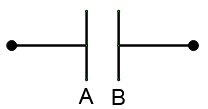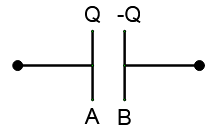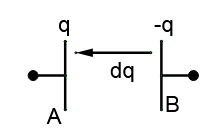Question
Question: Energy stored in between plates of parallel plate capacitor of area A, separated by distance d is: ...
Energy stored in between plates of parallel plate capacitor of area A, separated by distance d is:
& A.~~~~~~~\dfrac{{{\varepsilon }_{0}}{{E}^{2}}Ad}{2}~~~~ \\\ & B.~~~~~~~\dfrac{{{\varepsilon }_{0}}{{E}^{2}}A}{2d}~~~~~ \\\ & C.~~~~~~~\dfrac{{{\varepsilon }_{0}}d}{2{{E}^{2}}A}~~~~ \\\ & D.~~~~~~\dfrac{Ad}{2{{\varepsilon }_{0}}{{E}^{2}}}~~~~ \\\ \end{aligned}$$Solution
Hint: Energy stored in a system is the total amount of work done to form the system. So, in order to calculate energy stored in between plates of parallel plate capacitors, we will calculate total work done to form it. For this we will calculate the word required to shift charge from one plate of capacitor to another.
Formula Used:
The work done to move charge q through a potential difference V is
W=qV
Capacitance of a parallel plate capacitor having potential difference V between its plates is given by
c=Vq
Capacitance of a parallel plate capacitor of area A, distance between plates d is
c=dε0A
Electric field between capacitor plates E is
E=dV
Complete Step By Step Solution:
Initially let us consider two capacitor plates A & B each with zero charge. Now, slowly charge is shifted from B to A till charge on A becomes Q and till charge on B becomes –Q


Suppose at time t, charge shifted is equal to q. So charge on A is q and charge on B is –q. Now if we further shift dq (where,dq→0 ) from B to A,

The work done for this will be given by
dW=dq×V … (1)
where dq is a small charge and V is a potential difference between plates.
For capacitor we can say-
c=Vq
V=cq
Putting this value of V in equation 1-
dW=cqdq
Capacitance of all capacitors depends only on the dimension of plates and distance between them. So capacitance will be constant for a given capacitor.
To calculate total work done in forming capacitor we will integrate this with limit of q from 0 to Q,
∫dW=0∫Qcqdq
On solving this we get
W=2cQ2
For capacitor we can say
c=Vq
Q=cV
Putting this value of Q in W=2cQ2we get
W=2cV2
Also electric field between capacitor plates E is
E=dV
V=Ed
Putting this value of V in W=2cV2 we get
W=2cE2d2
Also for capacitor we can say
c=dε0A
Putting this value of c in W=2cE2d2
W=21×dε0A×E2d2=2ε0E2Ad
So the correct option is A.
Note: V in all the formulae is the potential difference between the plates, not the actual potential of any of them. The electric field anywhere between the capacitor plates is constant and has its magnitude equals to
E=dV .
This question can also be done by using the formula of electric field density, which is
E=2ε0E2
If this will be multiplied by total volume (product of area of plates and distance between them) between capacitor we will get our answer
2ε0E2×Ad=2ε0E2Ad
